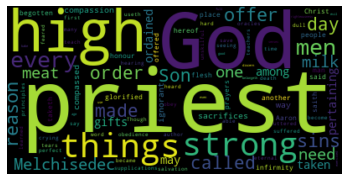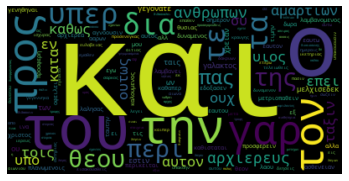The version used is ESV
Titles for God
- Father - God: 1,4
- Son - Jesus, Christ, Son
Actions of Yah
- 1: appoints High Priest
- 4: calls men for High Priest; called Aharon
- 5: spoke & appointed Jesus as High Priest; begat Jesus
- 7: heard Jesus' supplication & prayer; saved Jesus
- 9: made Jesus perfect
- 10: designated Jesus as High Priest
- 12: gave men oracles
Actions of Jesus
- 5: didnt exalt himself
- 7: offered prayers and supplication; revered Yah
- 8: obedient and suffered
Actions of man
- 1: act on behalf of other men to offer gifts and sacrifice for sins
- 2: deal gently with ignorant and waywards
- 3: offers sacrifice for his own sins and other people
- 11: became dull of hearing
- 12: are not teachers still
Commands
- 7: be pious to be heard by Yah
- 8: learn obedience thru suffering
- 12/11: be sharp, hear and do, become teachers
- 13: become skilled in word of righteousness
- 14: constant practice of distinguishing good from evil
Repeating words
Wordcloud of the KJV text

and using ESV text

Here is the Greek Textus Receptus, without any stop words.

Keywords
Outside of God, Jesus
- high priest
- milk and meat
- salvation
- obey/obedience
Figures of Speech
Again most of the metaphors are also physical and spiritual in addition to the metaphysical.
- 1: gifts and sacrifice for sin points to Yeshua
- 5: begotten for choosing or calling beloved
- 6: order of Melchizadek to signify both king and priest
- 11: dull of hearing - unable to act what is heard, since shema is hear and do in Hebrew
- 12: milk for elementary teaching and meat for higher teaching
- 13: infant for early believer
- 14: mature for growth of the believer
Lists
Cause & effect
Compare/Contrasts
- 1-4: men high priest relative comparison
- 5-10: Christ with high priest; compared to high priest of Aharonic line in 5/7/8 and contrasted using Melchizadek priesthood in 6/10
- 11-14: comparison of believers in various stages of growth and how we have not grown
- 12-14: milk and solid food
- 12: teacher vs students
- 13/14: infant vs mature
God's emotions: Anthropopathism
My view is that Yah is above emotions and the feelings, we men feel. Although the language of feelings and emotions are used through out the Bible in connection with Yah, we have to reconcile that with the fact that our finite brain cannot comprehend the full nature of our Creator. These are but words with meaning we can comprehend to describe to us His intent and character. The figure of speech is that of anthropopathic, ascribing to human emotions.
Although there are several verses in the Bible attributing human emotion language to Yah, we need to accommodate those with the below passages:
- [James1:13] Let no one say when he is tempted, “I am being tempted by God,” for God cannot be tempted with evil, and he himself tempts no one.
- [Num23:19] God is not a man, that he should lie; neither the son of man, that he should repent: hath he said, and shall he not do it? or hath he spoken, and shall he not make it good?
- [Titus1:2] In hope of eternal life, which God, that cannot lie, promised before the world began;
- [Isa27:4] I have no wrath. Would that I had thorns and briers to battle! I would march against them, I would burn them up together.